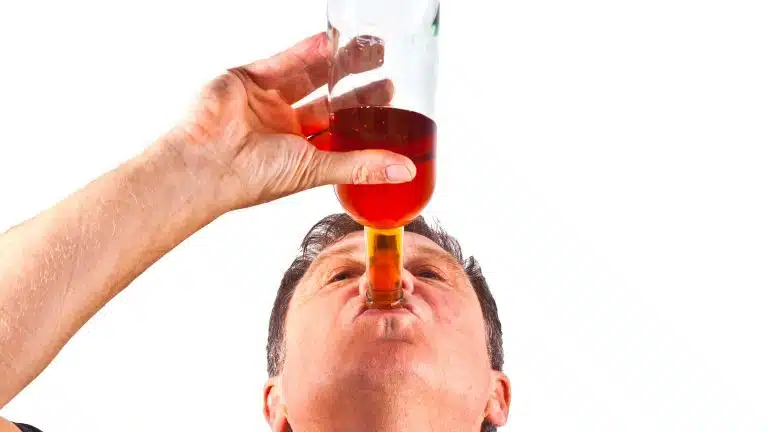Drinking Wine To Get Drunk | How It Works & Other Effects

Wine, despite often being cited for its potential benefits and having cultivated a very different reputation compared to either beer or liquor, can cause severe intoxication if consumed in high quantities.
Those who begin regularly drinking wine in excess put themselves at risk of severe consequences like drunk driving, alcohol poisoning, and alcohol use disorder (AUD).
How Much Wine Does It Take To Get Drunk?
A person is considered drunk when their BAC rises to .08-.10% or higher, though the effects of wine may be clearly felt after as little as one or two glasses:
- an average 170lb woman reaches this point after around 4 glasses of wine
- an average 200lb man reaches this point after around 6 glasses of wine
Alcohol Equivalence
Alcohol equivalence is the principle that a set amount of pure alcohol (ethanol) will exist in different types of drinks with very different serving sizes.
In other words, you can drink a lot more beer than tequila and still ingest the same amount of alcohol, leading to a similar blood alcohol content (BAC).
A Standard Drink Of Wine
Wine falls between beer and straight spirits. A standard drink of wine is a 5oz pour, compared to 12oz for beer and 1.5oz for 80 proof liquors. In each case, a standard drink is estimated to contain six-tenths of an ounce of pure ethanol.
Moderate use for women is considered to be one standard drink per day or less. Moderate use for men is considered to be two standard drinks per day or less.
However, alcohol’s effect on different individuals will likely vary depending on:
- body mass index
- weight
- the alcohol content of your specific drink
- if you’re drinking on a full or empty stomach
- your tolerance
- age
- liver health
- genetics
- hydration
- other factors
Getting Drunk On Wine
Absorption of alcohol is what gets you drunk, increasing your blood alcohol content (BAC).
This can result in some minor health benefits at low to moderate use, inebriation at heavier use, and alcohol poisoning, and severe health issues if use becomes excessive or chronic.
Wine, however, can be an especially dangerous drink for a few different reasons:
- it contains more than twice the alcohol content of beer by volume
- it’s pleasant to drink, as many wines tend to be quite sweet without the burn of higher ABV spirits
- as with wine tastings, wine is regularly consumed alone or with very light appetizers, accelerating its felt effects
- the alcohol content of most wines is just low enough not to trigger unease or nausea, as compared to consuming straight spirits
Drinking wine to get drunk can develop into an alcohol use disorder without raising the same red flags that might appear if you were drinking bottles of hard spirits like whiskey or vodka, or downing an entire case of beer on the regular.
Wine Drunk Vs. Other Drunk
You may hear people describe firsthand experiences of drunkenness very differently, arguing that wine drunk is very different from beer drunk or liquor drunk. One drink causes contentment, they might say, while another causes depression or increased libido.
Experts, however, credit this to the placebo effect. While different drinks may get you drunk faster or slower or get you drunker or less drunk depending on how much you have, alcohol is alcohol.
Alcoholic drinks don’t cause predictably different sensations or behavioral changes across the population as a whole.
Wine Hangovers Vs. Other Hangovers
The story is different when it comes to your experience the next morning, however.
Wines, and red wine in particular, have a mix of different types of alcohol and other organic compounds, a byproduct of the fermentation process.
Known as congeners, these toxic substances help give different wines and other dark beverages their distinctive colors, taste, and scents, and may include trace amounts of:
- methanol
- furfuryl
- fusel oil
- propranolol
- butanol
- acetaldehyde
- tannins
Congeners are believed to contribute to how hungover you feel the next day after a day of heavy drinking, with clear liquors like gin or vodka being more merciful than dark drinks.
Dehydration and alcohol’s toxic metabolites, however, remain more than capable of punishing you after a night of binge drinking, no matter how transparent your alcoholic beverages of choice might be.
Treating Alcohol Use Disorder
It’s one thing to be a wine lover, collector, or enthusiast. It’s another when you can’t go a day without hitting a bottle.
If you struggle with problematic or compulsive alcohol use, help is available. To learn more about our personalized treatment services, please contact us today.
Written by Ark Behavioral Health Editorial Team
©2024 Ark National Holdings, LLC. | All Rights Reserved.
This page does not provide medical advice.
Alcohol Research and Health - The Risks Associated With Alcohol Use and Alcoholism
Current Drug Abuse Reviews - The role of beverage congeners in hangover and other residual effects of alcohol intoxication: a review
National Institute on Alcohol Abuse and Alcoholism (NIAAA) - What Is A Standard Drink?
National Library of Medicine: MedlinePlus - Wine and heart health
Questions About Treatment?
Ark Behavioral Health offers 100% confidential substance abuse assessment and treatment placement tailored to your individual needs. Achieve long-term recovery.
100% confidential. We respect your privacy.
Prefer Texting?
Our friendly support team is here to chat 24/7. Opt out any time.







 Learn More
Learn More








